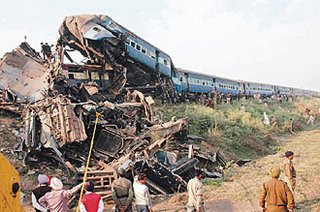Contrast it with another news item in Google news this morning: "Four killed, two injured in German seaplane crash."
All of us know that a plane crash killing 20 people in the west is much bigger news than a train accident in Chhateessgarh killing 200 in India.

Why?
There is no conspiracy behind it, it is a phenonmenon which can be rationally explained. Why is it that the death of a westerner is more newsworthy than the death of a third-world citizen? Why is it that a plane crash is a bigger accident than a train accident? Why is it that a protest involving 20 people in Capitol Hill gets covered by the worldwide media and a protest involving thousands in a third world country remains unnoticed?
Firstly, news is reported on the strength of its un-commonness and unacceptability. If train accidents, bomb blasts and rapes happen routinely in a third-world country, another of them is no earth-shattering piece of news. It is just routine, and will be covered accordingly. On the other hand, a plane crash in a western country is shocking and unaccpetable. Statistically, it is a rarer occurance. And socially, it is totally unanticipated and unacceptable. The sense of accountability and responsbility is much stronger in the west than in the third world. Citizens don't routinely protest in the western nations, and when they do, it is big news. Contrast this with public protests in a country like India, every city has at least a dozen protests and processions every day. People will lose interest in something which is common.
Secondly, news is an item of consumption. By and large, newspapers and TV channels are vehicles of advertising and marketing supported by the illusion of providing useful information to its readers. The kind of readership and audience decides which news is likely to spur their interest. Report too many news items regarding the poor people or the disenfrenchised, or the quick breeders, and your newspaper and TV channel risk being ignored in favour of another which is more entertaining.
Thirdly, investigation, in depth, of an incident is easily possible only where there is efficient technological and institutional infrastructure to support free and detailed investigation and enquiry. Most news items regarding a tragedy in the west are accompanied with enough details to sustain the interest of a reader. On the other hand, a train accident in Indonesia is just going to be reported in brief because it is going to be extremely difficult to get information about its causes, effects, implications, government response to it, names and details about the victims, etc. On the other hand, vast information is going to be easily available about an incident or the victims in a western society, because the institutions which provide such information are efficiently and professionally run. There are vested interests in suppressing details about an accident or loss of life in an immature society. As such, the "continued coverage" of an incident in the west is much easier and provides much food in terms of new information than in the third world.
Fourthly, individuation makes a tragedy tangible. A literate society which allows its citizens to pursue their interests and creatively contribute to the world around them, would place a higher value on human life than a society which only views people as economical units to be exploited. The accidental death of an IIT professor in India would command national headlines because of the uniqueness of that individual. The motif of uniqueness is much more prevalent in the west than in the east. In media, movies and newspapers, people in the third world are nameless, part of a herd, as good or bad as any of their counterparts. It is not considered a tragedy if a hundred men die who did nothing in their lives but live a traditional, conformant existence. On the other hand, in the west, since the social aspect of life is inferior to the the pursuit of individual goals, an accident has more unique and individual features attached to it. Each accident is, as it were, different, because there were unique individuals in those accidents. The uniqueness is sellable in the media to the multitudes, because of the vicarious nature of the audience. People want to know personal details about the victims, but such personal details will only be meaningful or interesting if the victims were not part of the herd, if they had a tatto on their forearms, if they were part of the local baseball club, if they were to be married soon. These are consumable details. Such details are juicy. The personal lives of such people are richer and more detailed than those of their counterparts in the third world.
Fifthly, the economic impact of an incident is directly proprotional to the resources spent upon its investigation, to its newsworthiness and to the width of its appeal. People who die in a plane crash are near the top of the economic heap. Poeple who die in a second class compartment in a train are near the bottom. The impact of a tragedy which occurs at the top of the heap is wider. The death of a rich owner of an enterprise affects thousands of his employees, the death of a labourer affects only his immediate colleagues and his family. A tragedy is as newsworthy as the people it concerns are influential.

No comments:
Post a Comment